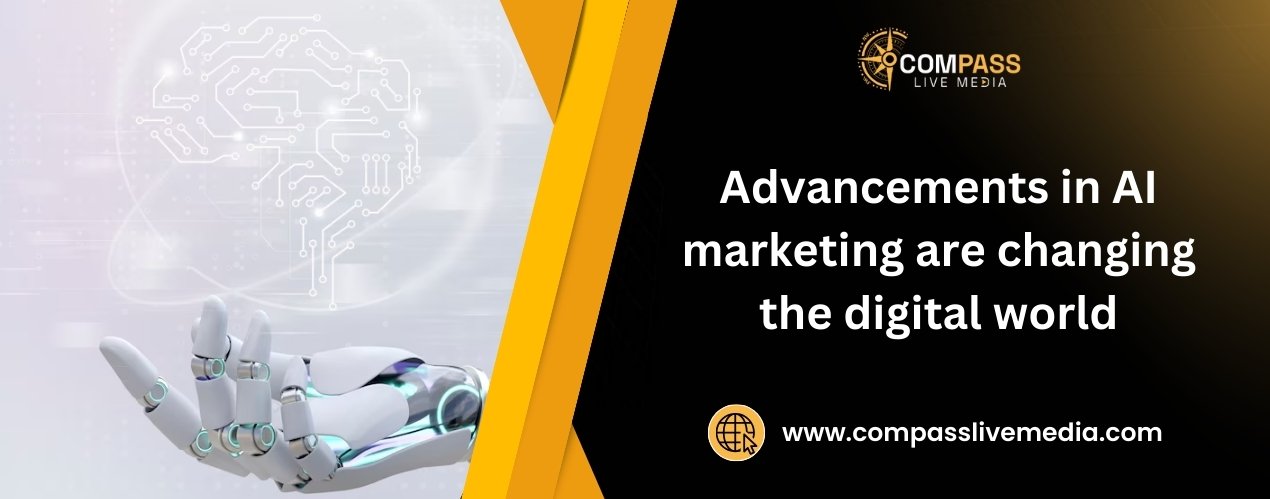Introduction
AI marketing agency or marketing Artificial intelligence is taking over the digital space with novel tactics and propositions for all types of companies. Starting from influencing customers’ perceptions to the more scientific forecast of the ability to predict outcomes. AI is redefining marketing as we know it. In this article. I attempted to define what exactly AI marketing is and briefly discuss the various kinds of AI. Then advantages and disadvantages of AI marketing. What the future of AI in marketing looks like, the relationship between AI and digital marketing, and that’s about it.
What is artificial marketing?
AI marketing can be defined as the integration of artificial intelligence tools in the marketing process. AI marketing in marketing strategy involves the use of data. Machine learning, and other technological techniques to enhance the campaign’s decision-making processes and the customer experience. Through processing large amounts of data, AI can reveal tendencies and insights that might not be seen by human marketers. Therefore, targeting and strategic planning will be more efficient.
What are the different types of AI?
1. Machine learning: AI that allows a system to modify its activities based on data input and use that new data to enhance the efficiency of its next operations without programming the system. It is applied in areas such as predictive analysis, recommendation engines, and customer grouping.
2. Natural Language Processing (NLP): This AI technology is aimed at recognizing the interaction between people and computers using natural language. NLP applications are used in the areas of chatbots, sentiment analysis, and voice search optimization.
3. Computer vision: A branch of artificial intelligence that allows a system to gather information from images or videos. Then analyze and make conclusions on its own. It is applied in image recognition, augmented reality, and the analysis of other graphical content.
4. Robotic Process Automation (RPA): RPA employs the use of AI to perform activities such as data entry, email marketing, AI for online marketing, and customer support, among others. This frees up marketers to do the more strategic things that they need to be doing.
Specifically, deep learning is a category of machine learning that focuses on the use of neural networks with many layers. More advanced activities, such as the discernment of images and language, are achieved by deep learning.
Benefits of AI Marketing
1. Personalization: AI can intake customers’ data to customize the services and products based on their preferences. Thus enhancing the client’s satisfaction and boosting their loyalty.
2. Efficiency: Outsourcing a few monotonous tasks can help marketers save time. Which they can then shift towards planning and creativity. Which in turn leads to better productivity.
3. Data-Driven Insights: Some of the advantages of AI include improved targeting and real-time reporting since the gathered data is analyzed in real-time. Which makes it possible to optimize campaigns.
4. Cost-effectiveness: AI marketing also has the potential to cut costs while at the same time enhancing ROI by automating processes and enhancing targeting.
5. Enhanced Customer Engagement: Chatbots and the best investor presentations are two instances of AI applications that can enhance customer relations and aid in client retention. Another example is the efficient contracting of customized email marketing campaigns.
What’s the future of AI in digital marketing?
The utility of AI for online marketing and digital marketing is remarkable, and it is likely to be expanded in the future as innovations keep on presenting themselves in this field. Marketing agencies involved in the application of AI have already adjusted to these changes. Providing services that depend on modern technologies. Here are some key trends to watch:
- Increased Personalization: AI will open up even higher levels of customization. Thus actualizing marketing messages based on individual preferences and behaviors in real-time.
- Advanced Predictive Analytics: AI will enhance the predictive model by better asserting the marketer’s expectations of customers and the market.
- Enhanced Customer Experiences: AI will also further improve interfaces such as chatbots and voice assistants and carry on by expanding the adoption of augmented reality.
- Integration with IoT: IoT will produce more data, which in turn will be processed and analyzed by the AI to establish more efficient marketing strategies.
- Ethical AI and Privacy: With AI deep-rooted in marketing. There will be a heightened awareness surrounding the proper use of AI as well as customers’ privacy.
Pros and Cons of AI in Marketing
Pros:
- Efficiency and Automation: AI reduces the number of tasks that would otherwise be done manually, thus freeing up the marketer’s time to engage in critical and creative work.
- Enhanced Analytics: AI also helps in base analysis, such as the detailed information of the customers as well as the campaign performance information, which can be beneficial in making better decisions.
- Improved Targeting: Marketing: AI helps in making precise targeting, which increases conversion rates, which are beneficial in marketing.
- Cost Savings: Automation and increasing the target audience can ultimately reduce costs and increase the ROI.
- Scalability: Another advantage of AI marketing tools is that they are highly flexible and could therefore accommodate large populations of data and interactivity, which makes the marketing tools ideal for growth-oriented businesses.
Cons:
- High Initial Investment: The idea of integrating AI technologies may also be expensive, thus acting as a challenge for implementing the approach for small businesses.
- Complexity: AI systems often have challenging configurations. Therefore, may be challenging to operate if one lacks knowledge in this matter.
- Data Privacy Concerns: Seminar AI also entails managing huge amounts of data, which can cause issues of privacy and security.
- Job Displacement: There is a potential risk for the full marketization of marketing jobs given that automating marketing tasks might be eliminated. Some of the tasks that have been traditionally carried out in the marketing trade.
- Over-Reliance on Technology: One of the disadvantages is the possibility of reliance on the use of AI. While there is always that creativity that is so profound in marketing.
What is the connection between AI and digital marketing?
Al configurations are all around the digital marketing spectrum, and the two lexis are interlinked. Thus, AI helps to advance digital marketing approaches by offering tools and directions to optimize accuracy, individualization, and effectiveness. Here are some key points of connection:
- Data Analysis: AI thrives in operational analysis tasks that involve the provision of data that can help drive digital marketing initiatives. This includes defining audiences, forecasting, and even timing and configuring a campaign.
- Personalized Marketing: They can make a highly accurate and individualistic approach to a customer because, with the help of AI, they use all the data connected with this customer. This is especially valuable for AI marketing agencies as well as AI marketing for small businesses in their quest to provide a personalized customer experience.
- Automation: AI automates functions like email and social media marketing or some other functions, which frees up marketers’ time to deal with more strategic and creative messages and services.
- Enhanced Customer Interaction: The use of artificial intelligence in chatbots and virtual assistants makes it easier to attend to the customers’ needs and demands, much to the delight of the customers.
- SEO and Content Creation: Some of the applications of AI include assisting in content optimization, idea generation for content, and even content generation for digital marketers, thus making content creation easier.
FAQs
1. How is AI changing the world of digital marketing?
AI algorithms are transforming the digital marketing landscape by analyzing vast data volumes to understand user preferences. Enabling businesses to create more engaging and conversion-oriented emails, significantly impacting the overall marketing strategy.
2. What is the role of AI in digital marketing?
Digital marketing focuses on customer experience, and AI can enhance it by delivering the best visitor experience, converting visitors into leads, increasing customer retention and loyalty, providing personalized content, and improving assets.
3. What is the AI revolution in digital marketing?
AI enables businesses to create personalized ads by analyzing data, resulting in higher click-through rates and conversions.


